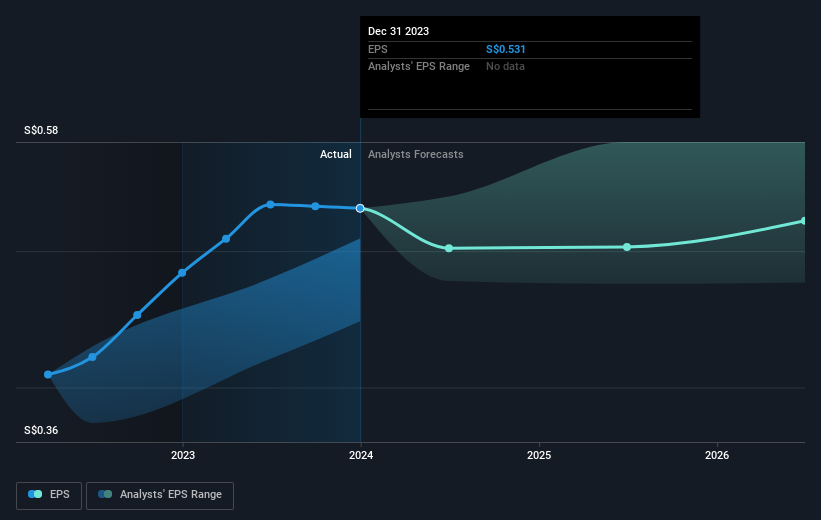Stock Analysis
- Singapore
- /
- Capital Markets
- /
- SGX:S68
Investors in Singapore Exchange (SGX:S68) have seen notable returns of 49% over the past five years

Generally speaking the aim of active stock picking is to find companies that provide returns that are superior to the market average. Buying under-rated businesses is one path to excess returns. For example, long term Singapore Exchange Limited (SGX:S68) shareholders have enjoyed a 25% share price rise over the last half decade, well in excess of the market decline of around 25% (not including dividends). On the other hand, the more recent gains haven't been so impressive, with shareholders gaining just 0.8% , including dividends .
Let's take a look at the underlying fundamentals over the longer term, and see if they've been consistent with shareholders returns.
Check out our latest analysis for Singapore Exchange
In his essay The Superinvestors of Graham-and-Doddsville Warren Buffett described how share prices do not always rationally reflect the value of a business. One flawed but reasonable way to assess how sentiment around a company has changed is to compare the earnings per share (EPS) with the share price.
Over half a decade, Singapore Exchange managed to grow its earnings per share at 8.9% a year. This EPS growth is higher than the 5% average annual increase in the share price. Therefore, it seems the market has become relatively pessimistic about the company.
The image below shows how EPS has tracked over time (if you click on the image you can see greater detail).

Dive deeper into Singapore Exchange's key metrics by checking this interactive graph of Singapore Exchange's earnings, revenue and cash flow.
What About Dividends?
It is important to consider the total shareholder return, as well as the share price return, for any given stock. The TSR is a return calculation that accounts for the value of cash dividends (assuming that any dividend received was reinvested) and the calculated value of any discounted capital raisings and spin-offs. It's fair to say that the TSR gives a more complete picture for stocks that pay a dividend. As it happens, Singapore Exchange's TSR for the last 5 years was 49%, which exceeds the share price return mentioned earlier. This is largely a result of its dividend payments!
A Different Perspective
Singapore Exchange shareholders gained a total return of 0.8% during the year. But that return falls short of the market. On the bright side, the longer term returns (running at about 8% a year, over half a decade) look better. It's quite possible the business continues to execute with prowess, even as the share price gains are slowing. Before forming an opinion on Singapore Exchange you might want to consider the cold hard cash it pays as a dividend. This free chart tracks its dividend over time.
If you are like me, then you will not want to miss this free list of growing companies that insiders are buying.
Please note, the market returns quoted in this article reflect the market weighted average returns of stocks that currently trade on Singaporean exchanges.
Valuation is complex, but we're helping make it simple.
Find out whether Singapore Exchange is potentially over or undervalued by checking out our comprehensive analysis, which includes fair value estimates, risks and warnings, dividends, insider transactions and financial health.
View the Free AnalysisHave feedback on this article? Concerned about the content? Get in touch with us directly. Alternatively, email editorial-team (at) simplywallst.com.
This article by Simply Wall St is general in nature. We provide commentary based on historical data and analyst forecasts only using an unbiased methodology and our articles are not intended to be financial advice. It does not constitute a recommendation to buy or sell any stock, and does not take account of your objectives, or your financial situation. We aim to bring you long-term focused analysis driven by fundamental data. Note that our analysis may not factor in the latest price-sensitive company announcements or qualitative material. Simply Wall St has no position in any stocks mentioned.
About SGX:S68
Singapore Exchange
Singapore Exchange Limited, together with its subsidiaries, operates as an integrated securities and derivatives exchange, and related clearing houses in Singapore.
Solid track record with excellent balance sheet and pays a dividend.

